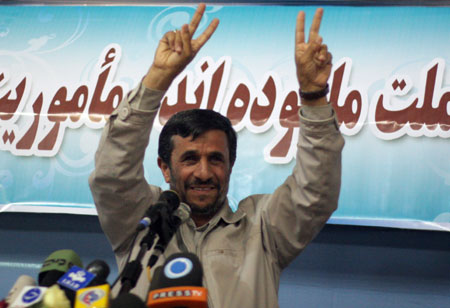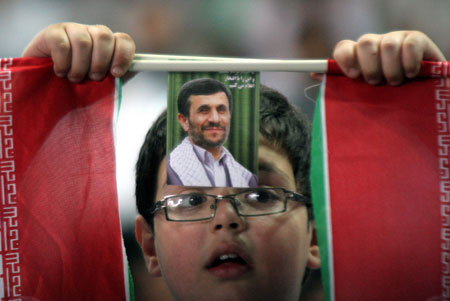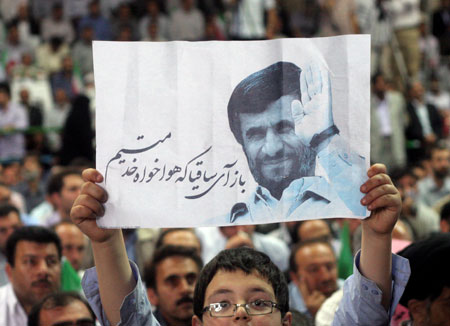The incumbent Iranian President Mahmoud Ahmadinejad will win his second term in office in Iran's 10th presidential election slated for June 12, chief editor of Iran's conservative Siasat-e-Rooz (Daily Politics) newspaper Mohammad Pirali said.
 |
|
Iran's President Mahmoud Ahmadinejad gestures to his supporters at an election campaign in Tehran, May 31, 2009. [Xinhuanet.com] |
"My prediction (about the result of election) is that he (Ahmadinejad) will be elected as president for the second time," Pirali told Xinhua in a recent interview, "although he will face tough conditions for (seeking) a second term and will have a very difficult competition," he said.
Ahmadinejad has been criticized by reformists and some conservatives for the country's soaring inflation and social problems such as high unemployment rate and housing shortage.
A few months ago, some observers forecasted that Mayor of Tehran Mohammad Bagher Ghalibaf would run for presidency, who finally did not take part in the competition.
"The decision not to participate in the election was due to his personal policy," Pirali analyzed, adding that Ghalibaf intended to gain more experience in municipality and prove his capabilities in administration to get ready for the next presidential election.
"Furthermore, Mr. Ghalibaf is in the camp of conservatives," Pirali said. "Since they (conservatives) have adopted the policy of convergence, they decided to put Mr. Ahmadinejad in their agenda."
However, Ahmadinejad has a conservative challenger -- Mohsen Rezaei, former head of Iran's Islamic Revolutionary Guards Corps, who promises to establish an efficient united government with participation of several parties and proposes a step-by-step approach to improve Iran-U.S. ties.
"Mr. Ahmadinejad and Mr. Rezaei are both from the camp of conservatives and they are committed to the principles of the (Islamic) regime," Pirali said, "but their strategies and ways to manage the government are seriously different."
"Although there is criticism (from the camp of reformists) towards Mr. Ahmadinejad's administration for its management and performance," Pirali said, "in fact, all the four candidates share the basic principles (of the Islamic regime) and they are just different in approaches to the management of society."
Some media has reported that Iran's Supreme Leader Ayatollah Ali Khamenei told Ahmadinejad to "be prepared for another term in office" and work for Iran for another four years, and he also implied his support to Ahmadinejad by instructing Iranian people to select the candidate who lives a simple life and refuses to yield to enemies.
 |
|
A child holds up a photo of Iran's President Mahmoud Ahmadinejad at an election campaign in Tehran, May 31, 2009. [Xinhuanet.com] |
"It is possible that he (Khamenei) prefers a candidate in his mind, but he is in the position (of Supreme Leader) that he cannot show his views towards a specific candidate," Pirali said, adding that it is his duty to generally outline the conditions for presidency to help the society have a worthy and right decision.
"But at last, it is the (Iranian) people who decide whether a president and his plans will remain or not," he added.
Pirali also considered challenges from the camp of reformists as "helpful" to make presidential election full of enthusiasm.
"Maybe it is important for us to see Mr. Ahmadinejad re-elected as president, but this is not our priority," Pirali continued, expressing that "Our objective is to have the majority of people participate in this election."
"The presence of reformists is very important which attracts more people from different layers of society to participate," the editor said, adding that since the reformists are considered as part of the Islamic regime's political powers, their views should be respected.
On the saying that the success of reformist candidates in election will improve Iran's image in the international community, Pirali noted that whoever wins the election, the cooperation between Iran and the international community will continue.
 |
|
A child holds up a poster of Iran's President Mahmoud Ahmadinejad at an election campaign in Tehran, May 31, 2009. [Xinhuanet.com] |
"The strategies of the (Islamic) regime concerning major issues are already defined," he mentioned, saying that "the president can just influence the (country's) approaches."
He also said he was sure that Ahmadinejad will be able to speedup the cooperation between Iran and the international community.
"If once a reformist candidate wins, the cooperation can continue...but it will be a little more difficult," Pirali concluded.
(Xinhua News Agency June 1, 2009)